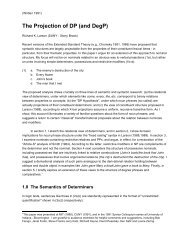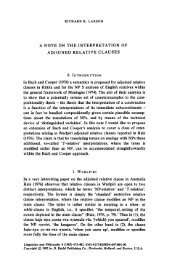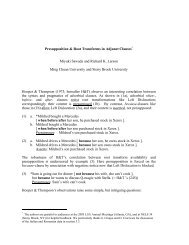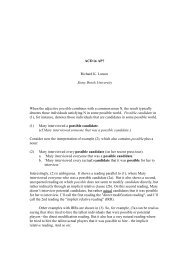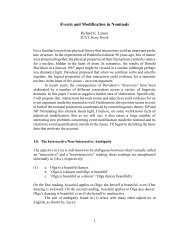Intensional Transitive Verbs and Abstract Clausal Complementation
Intensional Transitive Verbs and Abstract Clausal Complementation
Intensional Transitive Verbs and Abstract Clausal Complementation
You also want an ePaper? Increase the reach of your titles
YUMPU automatically turns print PDFs into web optimized ePapers that Google loves.
<strong>Intensional</strong> <strong>Transitive</strong> <strong>Verbs</strong> <strong>and</strong> <strong>Abstract</strong> <strong>Clausal</strong> <strong>Complementation</strong><br />
(26) a. Max wants him to be patient.<br />
b. Max [ VP wants [ CP FOR [ AgrsP him to be patient]]]<br />
c. Max [ AgroP him wants-FOR [ VP t [ CP t [ AgrsP t to be patient]]]]<br />
Inaudible FOR is assumed to bear an Accusative Case feature <strong>and</strong> to incorporate <strong>and</strong> check Case in<br />
concert with the verb, exactly like its overt counterpart (26c). 12<br />
This analysis inherits one attractive feature of the ECM account. Specifically, the ability of an<br />
embedded subject anaphor to be bound by a higher subject is explained in a parallel way (27a): the<br />
anaphor becomes a constituent of the higher clause containing its antecedent. 13 As we will see later, it<br />
is somewhat less clear that this account rules out three-argument verbs that take an infinitive with an<br />
overt subject rather than PRO (27b.i).<br />
(27) a. Max [ AgroP himself prefers-for [ VP t [ CP t [ AgrsP t to be patient]]]]<br />
b. i. Max VERB Seymour [ CP for [ AgrsP him to be patient]]<br />
ii. Max [ AgroP Seymour VERB- for t [ CP t [ AgrsP him to be patient]]<br />
Even if VERB + for/FOR can check the Case of at most one DP, it is still conceivable that the verb could<br />
possess its own independent ACC feature, allowing both Seymour <strong>and</strong> him to have their Cases<br />
checked. 14,15<br />
12 This analysis owes an evident debt to proposals by Kayne (1983), but essentially inverts the latter’s account.<br />
Rather than analogizing ECM cases with believe to the want-class by appealing to an inaudible prepositional<br />
complementizer Φ, we analogize want to the believe-class, appealing to a form of derived transitivity in the V-P<br />
composite.<br />
13 The for-incorporation analysis with want -type verbs is virtually forced under Reinhart <strong>and</strong> Reul<strong>and</strong> (1993) , which<br />
claims that reflexivization applies to syntactic predicates. A syntactic predicate is formed from a head H, its syntactic<br />
arguments <strong>and</strong> its external argument; syntactic arguments of H are those elements to which it assigns a Θ-role or<br />
Case. If the reflexive is to be a syntactic argument of prefer in John prefers for himself to win, <strong>and</strong> if for is assumed to<br />
be the source of Case-assignment, then for must incorporate with prefer <strong>and</strong> the two must assign Case.<br />
14 The possibility that both incorporating <strong>and</strong> incorporated elements contribute Case-features seems to be<br />
independently attested in the case of verb incorporation, as discussed by Baker (1988). We also note that the<br />
incorporations proposed here meet Baker’s Case Frame Preservation Principle, which requires that complex heads of<br />
category A in a given language can have at most the maximal Case assigning properties permitted to a<br />
morphologically simple item of category A. See Cho (1997) for arguments that a form of Case-checking analogous to<br />
(27b) explains multiple Accusative marking, as found in Korean "inalienable possession constructions". For further<br />
discussion, see also section 3.2.3.<br />
15 Lasnik <strong>and</strong> Saito (1991) reject a raising to Agro analysis of want on the basis of a number of arguments, all<br />
involving very subtle data judgments. For example, they note the contrast in (i), due to Bach (1977), where him <strong>and</strong><br />
Bob are to be understood as coreferent, <strong>and</strong> where the adverbial even-clause is to be understood as modifying the<br />
matrix verb. The suggestion is that the reduced acceptability in (ib) reflects a Condition C effect, the product of raising<br />
him to the matrix clause (where it c-comm<strong>and</strong>s Bob):<br />
(i) a. ?Joan wants him i to be successful even more fervently than Bob i ’s mother does.<br />
b. ?*Joan believes him i to be successful even more fervently than Bob i ’s mother does.<br />
9



